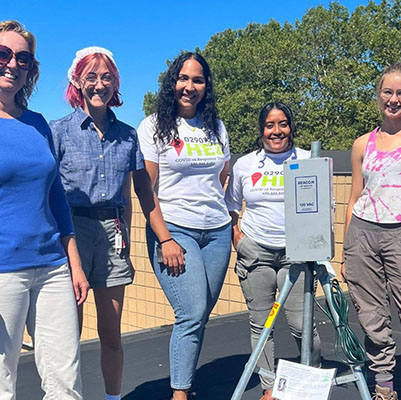 Students in the class will contribute to Hastings’ community-based project, Breathe Providence, which was inspired by the City of Providence’s Climate Justice Plan and developed in partnership with local government and community organizations including the City of Providence, the Racial and Environmental Justice Committee, American Lung Association and the Conservation Law Foundation. After placing 25 air pollution monitors across the city to test for pollutants identified by the EPA as well as carbon dioxide, this work will help bring to light the differences in pollutants across Providence. Dr. Hastings has already involved several students in the Breathe Providence Project to gain first-hand research experience and work within communities. When asked how she began engaging with the community, Dr. Hastings noted, “Community work takes time and relationship building. . . . Making connections is key, and we need to think about how to work more collaboratively.”
Students in the class will contribute to Hastings’ community-based project, Breathe Providence, which was inspired by the City of Providence’s Climate Justice Plan and developed in partnership with local government and community organizations including the City of Providence, the Racial and Environmental Justice Committee, American Lung Association and the Conservation Law Foundation. After placing 25 air pollution monitors across the city to test for pollutants identified by the EPA as well as carbon dioxide, this work will help bring to light the differences in pollutants across Providence. Dr. Hastings has already involved several students in the Breathe Providence Project to gain first-hand research experience and work within communities. When asked how she began engaging with the community, Dr. Hastings noted, “Community work takes time and relationship building. . . . Making connections is key, and we need to think about how to work more collaboratively.”
Scott Frickel’s research focuses on the intersection of nature, knowledge and politics with a focus on socio-environmental change. He previously ran the Community Engagement Core for the Superfund Research Program. Under the Superfund research grant, he has been built historical datasets on both active and former manufacturing sites, and former hazardous retail sites across Providence. Students in ENVS 1247 are considering how air quality in different neighborhoods may reflect a legacy of pollution and connections to social and economic demographics of the city, digging deeper into the experiences of those neighborhoods. Dr. Frickel became passionate about community-engaged work while working with environmental justice groups in the industrial corridor and the Lower Mississippi Delta while at Tulane University in New Orleans; he was intrigued by “scientists from the various disciplinary backgrounds who are actively engaged in movements for equity and justice as well as how experts are sort of enrolled or mobilized into those grassroots movements.” Dr. Hastings is motivated by passion for advancing equity both in pollution exposure and in STEM. She and Dr. Frickel look forward to continuing to build on these projects and the co-taught course and to provide more students with hands-on community-based experiences in the city where they live.